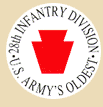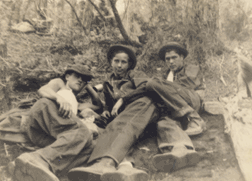
  
Introduction
My name is Albert J. Yascavage and I am a disabled United States combat veteran of WWII. I served with the Second Signal Company, Second Infantry Division from 26 Oct 1942 to 09 Oct 1945 in the European Theater of Operations and for a number of years thereafter with the 109th Field Artillery, 28th Infantry (Keystone) Division - Pennsylvania Army National Guard. I was honorably discharged from the National Guard on 01 February 1959 with the rank of Master Sergeant. During the war I served as a Wire Chief and later functioned as a Battalion Communications Specialist with the 28th Infantry Division. Throughout my military career I always valued the friendships formed with other soldiers. During wartime we were all buddies and learned to respect and depend on each other through good and bad times. Sadly, too many of my buddies did not come home and they are the real heroes; they gave their lives for their country. However many did return and over the years I have attempted to keep in touch as frequently as possible. Unfortunately that has been quite difficult as we all seemed to go our separate ways and most of us became involved with starting families and careers. With the advancement of the World Wide Web it now seems more possible than ever before to reach out and make contact with old and new friends. That is the very reason for this endeavor. I want to find some of my buddies and reestablish friendships formed so many years ago. I also want to tell a bit of my story and hopefully leave some part of a meaningful legacy. World War II veterans are becoming few in numbers with the passage of time and we need to be recognized and valued for our service. Welcome to Your World War II Buddy - I hope you enjoy this project and I look forward to hearing from old and new buddies.
My Story
I was born in Wilkes-Barre, Pennsylvania on 20 Mar 1923 and was raised in the small town of Plymouth in Luzerne County. Those were very difficult years considering the fact that we were about to face the Great Depression. We didn't have a whole lot of material goods but we did have family and enough food to eat and those were perhaps the most important things in life during those tough times. My Uncle Jack was always interested in radios and spent quite a bit of time building those little crystal sets. With me looking over his shoulder I learned a great deal and my fascination with radios began. In fact, it would last an entire lifetime and served as a foundation for my military service and civilian occupation. We spent many hours during the late evenings in those years listening to broadcasts from distant stations. It was something that really kept us going and was our "ear to the world." For a period of time during my high school years I joined the Civilian Conservation Corps (CCC). Jobs were scarce and every bit of income helped so I tried to do my part to help the family. The experience was wonderful. I got to see a lot of the country and worked in Santa Fe, Silver City, and Apache Creek, New Mexico. I visited many natural wonders including Carlsbad Caverns during my tour of duty with the CCC and then went back to live with my Aunt Helen in Coatesville, Pennsylvania. I was employed as an electrician by the Lukens Steel Company and continued to learn about radios and communications. Although the experience was meaningful I still wanted to see more of the world and decided to join the United States Maritime Service. I was trained to be a radio operator at Gallups Island just off the coast of Boston, Massachusetts and achieved the rank of Seaman, second class. Within a year of my enlistment the Japanese attacked Pearl Harbor and it was time to join the U.S. Army. I enlisted in the Army at Wilkes-Barre, Pennsylvania, was attached to the 83rd Infantry Division and received basic training at Camp Atterbury, Indiana. We had group training by marching twenty-five miles at a time and practiced radio intercept procedures on the SCR-206D, a field direction finder which was later used to zero in on enemy locations. I slept many nights with headphones affixed to my ears to learn Morse code and to increase my speed in translations. I was then transferred to the Second Signal Company, Second Infantry Division at Camp McCoy, Wisconsin. We completed numerous training exercises and went on maneuvers in Tennessee where we sharpened our survival skills. All of us could literally copy Morse code in our sleep. Although it has been sixty years since those days of basic training I can still copy the code with a high degree of proficiency. Upon completion of basic training we were notified that we were to be shipped overseas however due to security requirements few details were disclosed. We arrived in New York City to prepare for the journey and at the appointed time I was assigned to the USS ANNE ARUNDEL for transport across the Atlantic Ocean. We landed at Belfast, Northern Ireland and then it was off to Armagh, Northern Ireland for additional training. Little did we know that we were being prepared for the largest overseas invasion force ever assembled in the history of warfare. I was a radio operator with the Second Signal Company, Second Infantry Division and maintained communications with the 1st Army while operating an SCR-399 radio. I toured the countryside in Northern Ireland as time permitted and played basketball with the First Army team. I also maintained a part-time job as a firefighter and did some janitorial work in a factory at night. The main objective was to keep ourselves occupied as much as possible since all of us had a feeling that something very large was in the making. We traveled from Northern Ireland through England, Scotland, and finally to Tenby, Wales where our group was issued waterproof impregnated fatigues to guard against moisture and poison gas. We also waterproofed our vehicles and knew we were poised for an overseas invasion. All of us were trained and at our finest. We were ready to go! I landed at Omaha Beach on the Normandy coast on D-Day with the Second Signal Company, Second Infantry Division and was attached to the 9th Infantry Regiment. I served as a radio operator and was tasked with providing communication support from Regimental to Second Division Headquarters. We were instructed to carry our gas masks everywhere and knew how to get them on in record speed. It was on Omaha Beach that many young boys quickly became men. The sights are still with me and I shall never forget the valor, which was shared by each of us during those early days of June 1944. From Normandy we headed for France under constant heavy assaults. Enemy snipers were continually trying to disable our communications so the radio operators had to walk out into a clearing to draw fire from snipers in order to determine their position. We used a triangulated method to locate the direction of fire and then called in the coordinates for the artillery. Over fifty percent of our crew was killed by sniper fire. It was an awful price to pay however we knew that our role was invaluable if we were to attain victory over a tenacious foe. At St. Vith, Belgium I used the radio on my back to call in the enemy positions so that the men could move forward without marching into an ambush. Soldiers from the 106th Infantry Division replaced me so that I could be moved to a front line position. In the course of our advance the German forces broke through the lines in the Ardennes with tanks and we had to position our radios on a ridge to assist the infantry. We utilized the bazooka to fire upon German Tiger Tanks, which were equipped with 88mm flat trajectory projectiles. This was the beginning of the Battle of the Bulge and I found myself right in the thick of things as I assisted the wire crews with replacement of lines. The duty was extremely hazardous due to the fact that the enemy kept cutting our wires to disrupt communications from the front to the rear guard. I spent many days and nights crawling on my stomach through heavy snow and dead German and American bodies in order to replace the cut wire. I spliced the radio lines and restored communications between the mortar squads and rear guard elements. In the Huertgen Forest we sustained very heavy assaults and thousands of men perished. Many thousands more suffered terrible wounds during this battle. As I was making an advance with my unit an enemy artillery shell exploded at close range and I immediately jumped in a foxhole to seek cover. Unfortunately I ended up with shrapnel in my knee and was treated at a field aid station for the wound. After having the injury cleaned and dressed I rejoined my unit and was on the move once again. During the Battle of the Bulge I fought in towns and villages that are now a significant part of military history. They included St.- Lo, Ste. Mere -Eglise, Aachen, Malmedy, Houffalize, Wirtzfeld, and many others too numerous to mention. As we made our way across Germany I was present during the liberation of prisoners at the Dachau concentration camp. I witnessed with my own eyes the charred bodies in the crematoria as well as mounds of still smoldering corpses. It is a memory that remains with me even until this day. As the war began to reach a conclusion I was sent back to the 2nd Division Headquarters and was attached to the 9th Infantry Regiment once again in Leipzig, Germany. I crossed the Waldorf Bridge and interpreted for the Russians. As a child I learned eastern European languages and this proved to be a valuable asset at just the right moment. Upon completion of this assignment I spent approximately one month in Pilsen, Czechoslovakia as a radio operator. Although things finally started to become a bit quiet, we experienced numerous confrontations with the Russian troops. They seemed to believe that they were in command and wanted to give us orders as to what to do and where to go. Obviously, we told them where to go! After the peace treaty was signed I traveled back through Germany and France to Camp Lucky Strike. That's where we all camped while waiting to go home. Naturally we were thrilled to be leaving and felt very fortunate to have survived the war. We had a great deal of enjoyment playing cards, telling stories, and pitching pennies as we prepared for the trip back to Boston. We even managed to keep up our Morse code proficiency by sending messages to one another. When I arrived stateside I was sent to Camp Swift, Texas for discharge from the United States Army. I had done my duty and survived and was ready to get on with my life. A lot of people ask what type of communications gear I used while in the war and before I continue with my story, I'd like to give a brief summary of the equipment that was utilized by communicators in battle. I used the SCR-284, SCR-193, SCR-399 (mounted in a shelter on the back of a 2 ½ ton truck), SCR-300 (strapped to my back), SCR-536 (Walkie Talkies), BC-611, BC-610 (transmitter), BC-1000, BC-604, EE8 Telephones, BC-342, BC-348, Teletype Machines, and wire and wireless equipment for sending messages by Morse code. Perhaps it is normal for individuals to wonder if I experienced any real enjoyment during the wartime years. Of course I managed to have some fun like eating fish and chips in England, drinking Guinness beer in Ireland, and meeting many grateful families throughout Europe. Once I was with a group of guys trying to secure a warehouse full of liquor and we didn't want the Germans to get it so we filled a tub with champagne and we all took a bath. Sometimes we went for months without the comforts of personal hygiene so it was a great relief and a lot of fun to bathe in good champagne! I got to hear General George S. Patton give a rousing speech to my unit while in Armagh, Northern Ireland and also saw General Omar Bradley along the way. After I got home and was out of the military for a few months I started missing the service and decided to join the Pennsylvania Army National Guard. I resumed my military career with the 109th Field Artillery in Kingston and was in charge of a group of communicators. During the Korean Conflict the National Guard was placed on active duty and I was assigned to Fort Sill, Oklahoma where I supervised the training of foreign troops in tactical communications methods. I was married at Fort Sill in the base chapel and my best friend Jim Phillips and his wife were our witnesses. The captain played the part of "father of the bride" and escorted my future wife down the aisle. Another good friend and soldier in my outfit was Ed Geist. He and I established training procedures and coordinated troop exercises at Fort Sill. After duty in Oklahoma I was promoted and transferred to Fort Bliss, Texas where I established a radio school, designed the curriculum, and taught classes for high-speed Morse code communicators. We were at Fort Bliss the last week of December 1951 through the last week of May 1952 and lived on post at the Victory Park housing development. These accommodations were provided primarily for senior grade NCO's. Finally it was time to go back home to Pennsylvania. I was about to become a father! Throughout the next several years I served as Battalion Communications Chief for the 109th Field Artillery at the Kingston, Pennsylvania National Guard Armory. We trained in radio operations, responded to emergencies as necessary and completed annual training exercises at Ft. Indiantown Gap. After many years of service to our country I ended my military career as a Master Sergeant with the National Guard in 1959. It was an honor and privilege and I am most grateful to have had the opportunity to serve with some of the finest soldiers our nation has known - they were and are my buddies!
Civilian Life
Following my discharge from the National Guard I worked as an electrical contractor, radio and television repair technician, editor and publisher of numerous electronic journals, and as a dealer in Military Technical Manuals (TM's). I also was the proprietor of several retail electronic stores throughout northeastern Pennsylvania. I am an avid amateur (ham) radio operator and hold a Federal Communications Commission General Class license with the call W3UGD. I work many ham radio shows throughout the East Coast and am known in the amateur radio community as Surplus Al. I reside with my wife Dolores in Hunlock Creek, Pennsylvania.
Conclusion
It is my sincere hope that you have enjoyed reading Your World War II Buddy homepage. I have tried to make it interesting, informative, and accurate. This endeavor represents the story of a young lad who grew up in trying times in a small northeastern Pennsylvania community and went on to answer his country's call to duty. I'd like to receive your comments and look forward to hearing from other members of the armed forces who have had similar experiences. I especially would be most appreciative in hearing from former soldiers of the Second Signal Company - Second Infantry Division, and former members of the 109th Field Artillery - 28th Infantry Division. Please email all messages concerning Your World War II Buddy to surplsal@epix.net. I now invite you to click on my WWII Buddy Photographs. I appreciate your support and welcome your comments
|
||||||||||
|
||||||||||







